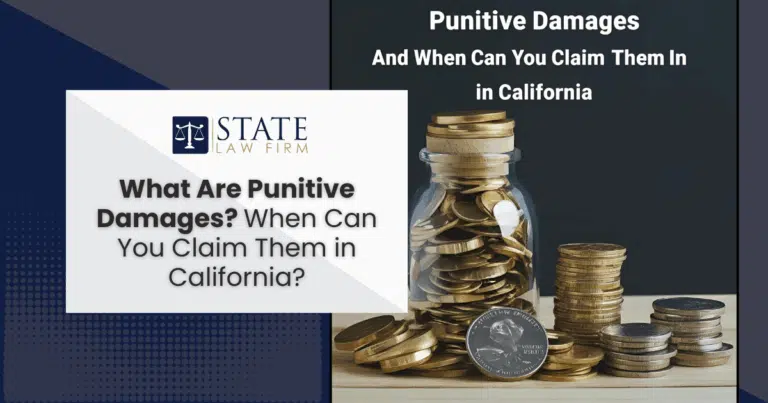When someone suffers an injury due to another person’s reckless or intentional behavior, compensating for medical bills and lost wages might not be enough. In some cases, California courts allow victims to seek punitive damages—a powerful tool designed not just to compensate, but to punish and deter the wrongdoer. These types of damages can dramatically change the stakes of a lawsuit, especially when egregious conduct is involved.
According to the U.S. Department of Justice, punitive damages are awarded in only about 5% of civil trials where the plaintiff prevails, making them relatively rare but incredibly significant when granted. Source: Bureau of Justice Statistics, Civil Bench and Jury Trials in State Courts.
At State Law Firm, we’re a boutique personal injury law firm based in Sherman Oaks, run by a team of young, driven attorneys focused on evolving into top-tier litigators. We don’t shy away from complex or high-stakes cases. Instead, we embrace them—because our mission is to help clients fight for justice, even when the odds seem steep. If you’re navigating the aftermath of a serious accident and wondering if punitive damages could apply to your situation, our Sherman Oaks car accident lawyers are ready to guide you through your legal options. This article discusses punitive damages, when they can be claimed under California law, and how they might impact your case or settlement.
Understanding Punitive Damages: Definition and Purpose
Punitive damages, also known as exemplary damages, go beyond compensating a victim for their losses—they’re designed to punish defendants for particularly egregious conduct and deter similar behavior in the future. While compensatory damages cover tangible costs like medical bills, lost income, and emotional distress, punitive damages serve a societal function by holding wrongdoers publicly accountable.
In California personal injury law, punitive damages are not available in every case. They are reserved for situations where the defendant’s behavior is so reckless, malicious, or oppressive that it demands more than financial restitution—a message.
Pro Tip: If your injuries resulted from something more than just negligence, such as drunk driving, intentional harm, or gross corporate misconduct, punitive damages may be worth exploring.
Legal Grounds for Claiming Punitive Damages in California
Under California Civil Code Section 3294, plaintiffs may seek punitive damages when the defendant is found guilty of oppression, fraud, or malice, and they must prove it with clear and convincing evidence. The statute defines each of these grounds clearly:
- Malice: Conduct intended to cause injury or despicable conduct carried out with a willful and conscious disregard for others’ rights or safety.
- Oppression: Despicable conduct that subjects a person to cruel and unjust hardship in conscious disregard of their rights.
- Fraud: Intentional misrepresentation, deceit, or concealment of a material fact known to the defendant, made to deprive a person of property or legal rights.
Importantly, simple negligence—even gross negligence-is—is not enough. The court must see evidence of something more egregious.
Real Talk: At State Law Firm, we regularly evaluate whether your case qualifies for punitive damages early in the litigation process. It’s one more way we look beyond the surface to help you fight back with strength.
Criteria Used to Determine Eligibility for Punitive Damages
Even if your case falls under one of the qualifying grounds, courts require a high burden of proof. California law sets the evidentiary bar at “clear and convincing evidence,” higher than the typical “preponderance of the evidence” standard used in civil cases.
Courts will often consider:
- The nature of the defendant’s conduct
- The degree of reprehensibility
- Whether the conduct was repeated or isolated
- The defendant’s financial condition, since punitive damages should “sting” appropriately
Quick Checklist: You might be eligible to claim punitive damages if:
- The defendant acted intentionally or with conscious disregard for your safety
- The harm you suffered was severe or traumatic.
- There’s evidence of a pattern of similar behavior by the defendant.
The Process of Filing a Claim for Punitive Damages in California
Claiming punitive damages is not just about adding a number to your lawsuit—it’s a strategic move that detailed facts, clear legal argument, and substantial evidence must support.
Here’s a general overview of the process:
- File the lawsuit: Include a request for punitive damages in your complaint, citing Civil Code Section 3294.
- Gather evidence: This includes documentation, testimony, and expert analysis that proves the defendant’s malice, oppression, or fraud.
- Pre-trial motions: The defense may try to strike your punitive damage claims before trial.
- Trial phase: If the case goes to trial, punitive damages are considered separately from compensatory damages and must be decided by a jury.
Because these claims are so technical—and because they can dramatically increase your compensation—it’s crucial to work with experienced litigators who know how to frame and defend the issue.
Are you thinking about filing a claim for punitive damages? Let’s review your case together and evaluate whether it’s the right approach. Our team has the courtroom experience to fight back when it matters most.
The Impact of Punitive Damages on Legal Cases and Settlements
Punitive damages can reshape a case. They not only influence the size of a potential jury verdict, but they can also increase pressure during settlement negotiations. A credible punitive damages claim can make insurance companies and corporate defendants more willing to settle on favorable terms rather than risk a massive jury award.
Punitive damages also serve as a deterrent. By hitting reckless or malicious actors where it hurts—their bottom line—California courts send a message that certain conduct will not be tolerated.
Notable Example: In Taylor v. Superior Court (1979), the California Supreme Court allowed a plaintiff injured by a drunk driver to pursue punitive damages. The court ruled that driving while intoxicated demonstrated a “conscious disregard of the safety of others,” satisfying the malice standard.
Closing Thought
Punitive damages aren’t just about punishment—they’re about justice. If you’ve been hurt because of someone’s intentional or outrageously reckless conduct, you deserve attorneys who understand what’s at stake and are ready to pursue every legal avenue.
At State Law Firm, we help clients take on the complex cases—and win. Whether you were injured in a car accident, harmed by a negligent business, or affected by misconduct that went too far, our Sherman Oaks car accident lawyers are ready to help you explore your complete legal options, including punitive damages.


